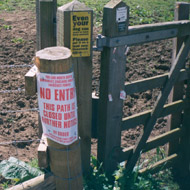
Adaptive management of disease outbreaks could save money and lives
Research by the University of Nottingham and Pennsylvania State University has proposed a new approach for managing and responding to outbreaks of disease.
A team of epidemiologists from the UK and USA say that lives and money could be saved if decisions are adapted to relevant information about the dynamics of the current crisis and not based on retrospective analyses of prior crises, trials and interventions.
Dr Michael Tildesley, a lecturer in infectious disease modelling in the School of Veterinary Medicine and Science at the Univeristy of Nottingham and co-author of the paper, said: “Organisations involved in the outbreak of disease should be able to change approaches as new information becomes available. In the early stages of a new disease outbreak there is often insufficient information to make a decision regarding the best control policy. At the same time policy makers cannot afford to delay until that uncertainty is resolved before introducing interventions. Adaptive management provides a mechanism for introducing control at the onset and then using information gained during the outbreak to determine the most effective long term management action.”
The study, published in the academic journal PLOS Biology, suggests that current efforts to halt or prevent the spread of disease fall short because of limited information and confusion about disease dynamics. The research shows that adaptive management would allow researchers to use the knowledge gained during an outbreak to update ongoing interventions with the aim of containing outbreaks more quickly and efficiently.
The research team explored the implications of adaptive management on the 2001 foot and mouth outbreak in the UK and measles vaccinations strategies in the USA as examples of how a more flexible approach could save both money and lives.
Dr Tildesley said: “We demonstrate expected savings of up to £20 million in terms of lower livestock losses to culling in a foot-and-mouth outbreak. Similarly, up to 10,000 cases could have been averted in a measles outbreak like the one observed in Malawi in 2010. Adaptive management allows real-time improvement of our understanding, and hence of management efforts, with potentially significant positive financial and health benefits.”
The paper, Adaptive Management and the Value of Information: Learning Via Intervention in Epidemiology, can be downloaded from: http://www.plosbiology.org/article/info:doi/10.1371/journal.pbio.1001970.
Image (C) Wipsenade



 The Animal and Plant Health Agency (APHA) has updated its online reporting service for dead wild birds.
The Animal and Plant Health Agency (APHA) has updated its online reporting service for dead wild birds.